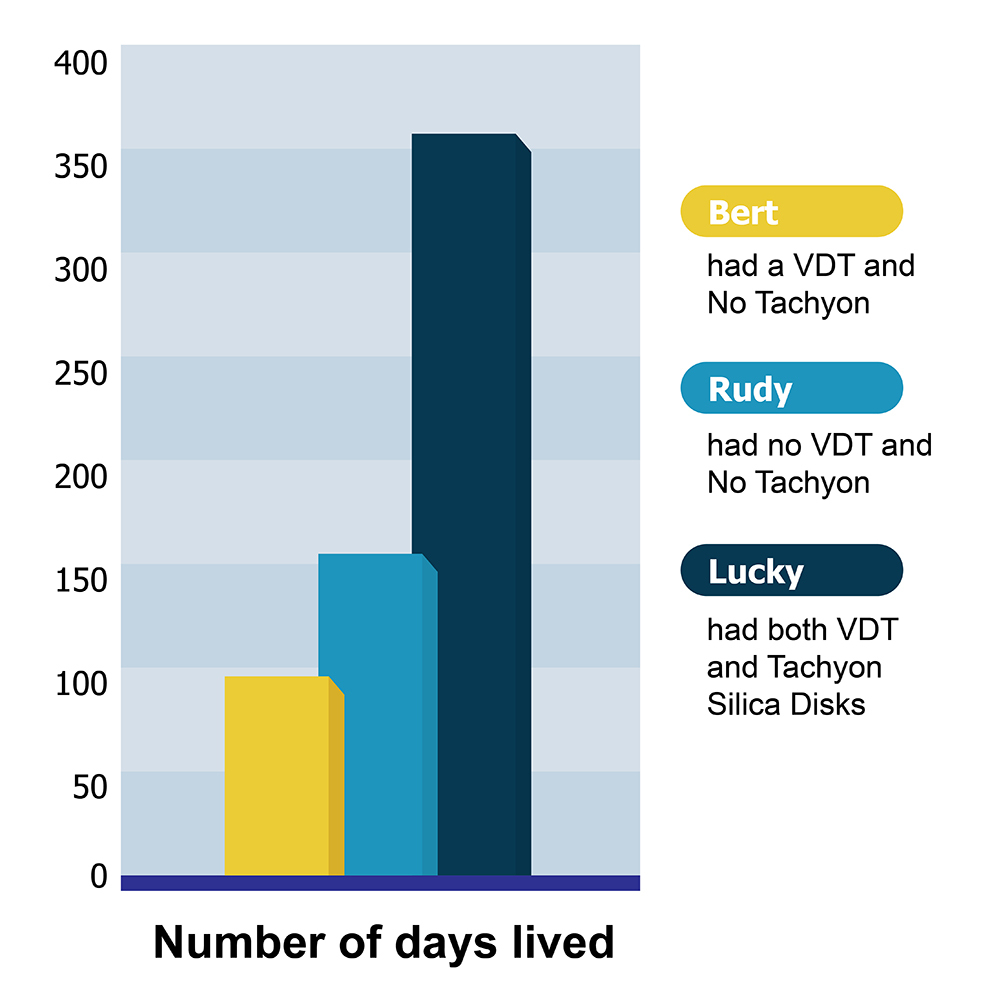EMF and Mice Experiment with Tachyon and CRT
Exploring the Protective Effects of Tachyonized™ Silica Disks (SD-1)
Introduction: EMFs, Biology & the Tachyon Solution

In the emerging field of bioenergetic research, the effects of electromagnetic frequencies (EMFs)—especially in the extremely low frequency (ELF) range—are becoming increasingly significant. These frequencies, commonly emitted by electrical systems and digital devices such as video display terminals (VDTs), are now recognized as potential stressors to biological systems, disrupting subtle organizing energy fields (SOEFs explained), neural function, and cellular integrity.
In response to this, pioneering experiments have been conducted to evaluate whether Tachyonized™ Silica Disks (SD-1), developed by Advanced Tachyon Technologies, can neutralize the chaotic effects of ELFs and restore coherence to living systems.
Carl D. Troppy’s Original Experiment
Purpose & Setup
 Carl D. Troppy—a licensed natural health educator and independent researcher—designed a study using feeder mice to examine the effects of EMFs and the modulating influence of SD-1 disks. His experimental setup involved:
Carl D. Troppy—a licensed natural health educator and independent researcher—designed a study using feeder mice to examine the effects of EMFs and the modulating influence of SD-1 disks. His experimental setup involved:
- Three mice: Rudy, Bert, and Lucky
- Identical cage environments with high-quality food, water, and exercise equipment
- Proximity to VDTs emitting ELF radiation
Mouse Groupings and Observations
| Mouse | EMF Exposure | Tachyon Support | Behavior & Longevity |
|---|---|---|---|
| Rudy | None (Control) | None | Healthy; lived 5 months, 5 days |
| Bert | Exposed to unshielded VDT | None | Nervousness, aggression, early death after 3 months, 4 days |
| Lucky | Exposed to same VDT | ✅ SD-1 Disks | Calm, vital; lived 12 months, 10 days |
Conclusion: The dramatic contrast between Bert and Lucky—despite identical EMF exposure—suggests that Tachyonized™ Silica Disks mitigated the disruptive effects of EMFs and supported biological coherence and longevity.
Sheryl Burton’s Replication: Deeper Confirmation with Enhanced Methodology
To validate Troppy’s findings, health care provider and researcher Sheryl Burton undertook a rigorous replication study. Her work introduced greater environmental controls, larger populations, and long-term behavioral tracking, creating a robust model for assessing EMF impact and Tachyon protection.
Experimental Design
Burton established two identical study sites:
- Site #1: No Tachyon support (EMF exposure only)
- Site #2: Identical conditions with SD-1 Silica Disks installed
Both sites featured:
- Larger, spacious cages to minimize stress
- Ceramic feeding bowls and glass water bottles to reduce material interference
- Exercise wheels for natural behavioral expression
- Uniform lighting, temperature, and air quality
The only variable between the two environments was the presence of Tachyonized™ Silica Disks at Site #2.
Site #1 – Without Tachyon Support
Within just 15 days, mice at Site #1 began exhibiting clear signs of energetic and behavioral breakdown:
Observations:
- Increased aggression and fighting among mice.
- Hyperactive startle responses, indicating autonomic nervous system dysregulation.
- Avoidance behaviors, erratic pacing, and reduced use of exercise wheels.
- Reduced food and water consumption.
- Physical signs of stress, such as poor grooming and lethargy.
Outcomes:
To preserve health, Burton isolated the two most stable mice from this group. Nevertheless:
- One died after 79 days.
- The other died at 91 days—less than 25% of expected lifespan.
Site #2 – With SD-1 Tachyon Silica Disks
In sharp contrast, Site #2 mice demonstrated coherent, balanced behavior and vibrant health:
Observations:
- No notable aggression or social withdrawal.
- Mice appeared calm yet inquisitive, with healthy startle reflexes.
- Regular grooming, feeding, and use of exercise wheels.
- Easy handling during cage maintenance—suggesting emotional regulation.
Outcomes:
- Mice remained healthy and vital well beyond 375 days.
- Their longevity and emotional tone mirrored Troppy’s mouse “Lucky,” reinforcing the replicability and effectiveness of Tachyonized Silica Disks.
Burton reported that “the contrast between the two environments became unmistakable by the third week and undeniable by the third month.”
⚛️How Tachyonized™ Silica Disks Work
The SD-1 Disks used in these studies undergo a proprietary Tachyonization™ process, which:
- Creates a permanent quantum-access pathway through matter into the zero-point energy field—also known as the Tachyon field.
- Does not block or shield EMFs, but rather interacts with chaotic frequencies to restore quantum-level coherence to biological systems.
- Supports the body’s own SOEFs (subtle organizing energy fields) in maintaining vitality, resilience, and energetic order.
As modern quantum field theory now acknowledges (see Paczos et al., 2024), tachyonic fields are mathematically valid solutions—offering a foundation for understanding how faster-than-light coherence can interact with life.
Conclusion: A New Scientific Paradigm in EMF Mitigation
These experiments by Carl D. Troppy and Sheryl Burton together offer a transformative lens on EMF resilience:
- EMFs disrupt biological balance, especially over time.
- Tachyonized™ tools restore coherence, allowing organisms to reorganize and thrive even in electrically polluted environments.
- The SD-1 Disk operates not through blocking, but by restoring a vibrational connection to Source—a universal field of order beyond frequency.
Burton strongly recommends that individuals working near computers, routers, electrical panels, and 5G devices consider using Tachyonized™ Silica Disks as part of a holistic wellness strategy.
